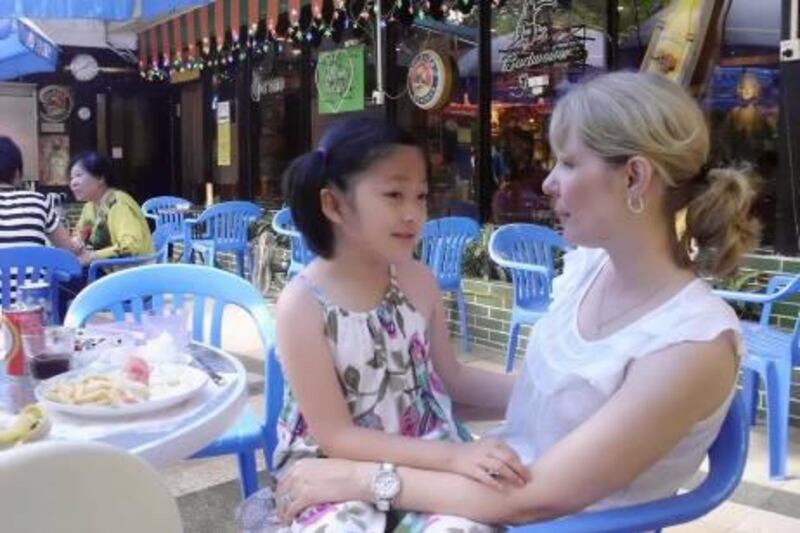GUANGZHOU, CHINA // Baby Savannah Patterson latched on to her new mum the first time they met.
"It was the best day of my life," Savannah's 33-year-old adoptive mother said of the first time she held her 18-month-old girl.
A few days earlier, Savannah was in an orphanage in Maoming, a city in southern China.
Now, sitting quietly in a pushchair in a park in Guangzhou in southern China, she has just been adopted by a family from Michigan and is about to start a new life in the United States.
"She hugged me right away. She let me hold her," said her new mother.
Between 1999 and 2010, 64,043 children from China were adopted by parents from the US, more than from any other country.
Some couples, like the Pattersons, looked to China because, with five sons, they were keen for a daughter.
They paid an estimated US$40,000 (Dh147,000) in fees, transport costs and other expenses in the process.
Others have adopted from China because they were unable to have children of their own. Adoptive parents may also be motivated by a desire to give a child a better future.
"The US has a lot of programmes to help children, [such as] foster care, and better resources for orphans than China. We thought we could help more. In the US they don't need help as much," said Savannah's mother, a legal industry worker who declined to give her full name.
In addition to being expensive, adopting from China can be agonisingly slow as couples wait to be approved by the authorities in China and their home country, and then to be offered a child by an adoption agency.
US State Department figures show adoptions from China have plummeted to just 2,589 between October 2010 and September 2011, from a peak of 7,906 in 2005. US adoptions from other countries, such as Russia and Ethiopia, have also fallen.
There are several reasons for the drop in numbers.
China has imposed stricter controls - banning adoptions by people who are clinically obese - for example, while the authorities are promoting adoption within China, reducing the number of children available for international adoption. Rising living standards mean fewer healthy babies are being abandoned and an increase in the abortion of female foetuses means fewer unwanted baby girls are born, although there are still more girls than boys given up for adoption in China.
It now typically takes six to seven years to adopt a Chinese child without special needs, according to Cory Barron, the outreach director of the US-based adoption agency Children's Hope International.
When a couple is looking to adopt a child such as Savannah who has a medical issue, in her case a blood condition, the adoptive parents may have to wait only a year.
"People in the middle of a long wait are deciding that they will go ahead and adopt a child that may have some special needs," said Mr Barron.
A common issue with children categorised with special needs is a cleft lip or palate. While this can be rectified through surgery, Gillian Healey from the UK-based charity Care of China's Orphaned and Abandoned said "there are baby homes full" of children with the condition.
"In China, it can be viewed as a curse for disrespecting ancestors and, in any event, people often do not have the funds to pay for corrective surgery themselves and do not realise that the Chinese authorities will fund it," she said.
Poverty remains a major reason behind the abandonment of children with special needs, with parents unable to pay for treatment, she said.
Although the number of children adopted from China has fallen, concerns remain over practices described as unethical.
There have been reports of officials forcibly taking babies from parents and selling them to orphanages that collect thousands of dollars from foreign adoptive parents.
Also, in an "ethics alert" posting in March, the group Parents for Ethical Adoption Reform said special-needs programmes involving Chinese children were "riddled with unethical, non-transparent practices that do not adequately safeguard the children involved".
"The result is commodification of children, dilution of the integrity of adoption, and the placement of unwitting children and adults into crisis situations," the organisation said.
The group also said agencies or other adoption organisations may "downplay" the challenges parents face when adopting a child with special needs.
Yet Mr Barron insisted concerns related to an "extremely low" percentage of cases.
"If you say there's been some corruption in international adoption, let's shut it down, then you're relegating ... children to institutional care for the rest of their lives," he said.
His agency was "cautious ... to make sure that the family is prepared" for a child with special needs, he said.
"Some international organisations think all children should be in orphanages or some kind of foster care. They think that's OK. We think that's not OK," he added.
Some families, having adopted from China, are keen for a sibling for their first child.
Steve and Kris Vanderweele, both 42 and also from Michigan, recently adopted nine-month-old Quinn, who is also classified as having special needs as a result of a minor heart murmur. She has become a sister to Kate, eight, who was adopted from China at 13 months.
"She knows her story, she knows how we became a family," Mrs Vanderweele, a former teacher said of Kate. "We celebrate certain holidays they celebrate here, such as Chinese New Year. She knows about the 'Gotcha Days' and we celebrate that back home."
While the Vanderweeles are well-versed in what it means to raise a child adopted from China, the Pattersons are just starting on what they hope will be a rewarding experience - and Savannah's five brothers are "very excited" to have a sister.
"We're probably going to spoil her a lot," said her mother with a smile.







